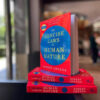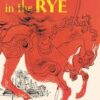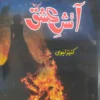-
 The Laws of Human Nature 1 × ₨ 750
The Laws of Human Nature 1 × ₨ 750 -
 Men in the Sun 1 × ₨ 900
Men in the Sun 1 × ₨ 900 -
 The Catcher in the Rye 1 × ₨ 320
The Catcher in the Rye 1 × ₨ 320 -
 Aatish E Ishq 1 × ₨ 2,400
Aatish E Ishq 1 × ₨ 2,400
Subtotal: ₨ 4,370
The God of Small Things” is the novel from Arundhati Roy that became the Booker Prize winner in 1997. The novel is full of riches and poetry as it tends to trace forbidden love, pressures from society, and family relationships against the background of Kerala in the 1960s. Alternating between past and present, the novel weaves together small personal histories with overarching social and political themes.
In this novel, the lives of fraternal twins, Rahel and Estha, who were separated during childhood due to a fatal accident, form the pivotal concern. Between the traumatic childhood life of the twins and the reunion between them as adults, it brings to the surface the intricate and complex relationship within their family along with all the social structures that rule their lives.
It has at the center a love affair between Ammu, mother of the twins, and Velutha, a worker from a lower caste that the family employs. Their love affair goes against the strict caste system and social code of Indian society and results in disastrous consequences. The novel probes how the theme of the caste system, gender oppression, and colonialism govern the lives of the characters in the novel.
Principal Themes:
Caste and Class: In the novel, the gruesome aspects of the Indian caste system are discussed, such as the stigma surrounding the “untouchables”, like Velutha. Ammu and Velutha’s love story and its disastrous consequences reflect the brutality and injustice of such social structures.
The Family and Forbidden Love Family ties are at the heart of the novel, particularly the bond between the twins and their mother, Ammu. The love between Ammu and Velutha is forbidden, but I also see it in a more general sense: the social norms and taboos that determine what people may or may not do, and for what.
The social and political life of the Keralan people is seen in tandem with that of colonial and post-colonial machinery of power where all operate to oppress the powerless.
Childhood and Trauma: Major parts of the novel are filtered through the eyes of two children: Rahel and Estha. Their innocence is shattered by the events that unravel, forever raising long-term trauma that affects their lives into adulthood.
Through the non-linear structure of the novel, memory is configured as fragmented. It filters through into the story bit by bit while jumping from one time to another till the end of the material, underlining how memories bring aspects of the present into being for the characters.
Writing Style:
The prose is lyrically rich and very evocative, with much symbolism that generates strong emotions through this non-linear approach towards gradually unearthing the central events of the narrative. In a similar way, language toys with the linearity of form-to make use of poetic sketches, folklore, and stream-of-consciousness elements.
General Message:
It is an immeasurably moving meditation on love and loss and the ways in which personal and societal forces are intertwined to shape lives, and how thoroughly political it remains while also offering a tender, a tragic, and very human portrayal of the human condition. The novel narrates through the lenses of Rahel and Estha “small things” that mark people’s lives: such small things as happiness, heartbreak, or apparently minor details that “add up to more.”.
Reviews
There are no reviews yet.